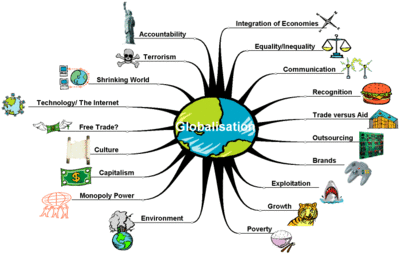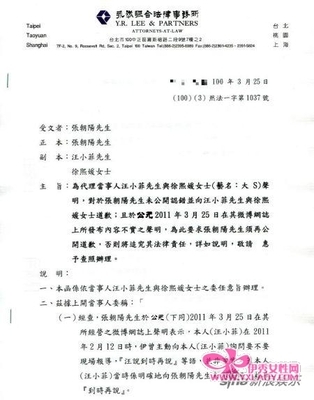How does Developing Countries Face theGlobalization?
1.Introduction
Globalization normally means a decoupling of space and time,emphasizing that with instantaneous communication, knowledge andculture can be shared around the world simultaneously. It is aprocess of integration, including economic globalization, politicglobalization, cultural globalization, and so on. As a trend,globalization effects the world, especially those developingcountries. Facing this problem, how developing countries treat itis more important
This paper will prove that globalization is an opportunity fordeveloping countries. Out of this reason, the author divides thepaper into three chapter. The first chapter is introduction. Thesecond chapter will prove the proposition the author gives. Thethird chapter is conclusion.
2.The Effect of Globalization on Developing Countries
Globalization is just like a sword. On one hand, it candecreases the cost, improves the efficiency of using resources, andpromotes the adjustment of world economic structure, especially inhi-tech productions. On another hand, it brings many problems andrisks to the host countries and home countries, such as economicrisks, political risks, etc.
2.1 The History ofGlobalization
Globalization is a history appearance. If you search oninternet, you will find at least 5 million items aboutglobalization. Globalization has been connected with human life. Itis not a new appearance.
In the 11th century, Venetian developed its tradewith other cities and districts to prosper its country. In the16th century, the first great expansion of Europeancapitalism took place. In the late 19th century, thereappeared a big expansion in world trade and investment because ofthe invention of electric power and steam engine, the expansion ofrail roads and the foundation of gold standard. But this wasbrought to a halt by the First World War and the bout of anti-freetrade protectionism which resulted in the Great Depression in1930s. It is thought that this period was an interruption to theprocess of globalization that started in the late 19thcentury. From 1973 to now, the third globalization expansion hasbeen developing. Information technology, finance creation,production globalization and finance free policy promote thisglobalization expansion. The multinational companies interested inproducing and selling in the domestic markets of nations around theworld developed quickly. Fast air and IT development enhance theprogress of international business. Since we have entered the newcentury and with the fast development of science and technology,international business has been increasing fast, which can be, insome way, considered as the result of globalization.
2.2 The Effect ofGlobalization on Developing Countries
When discuss globalization, the most disputative one is itseffect on developing countries. If globalization is a sea, thecountries all over the world are all on the board, but not in thesame ship. In another word, developed countries are all in theflattop, developing countries are in the small ship while someAfrican countries on the bank. The key of this problem is that howdeveloping countries treat it.
Firstly, globalization is a development trend of history. Manyforeign scholars often use “ is being engulfed in the globalizationprocess ” when they talk about the developing countries andglobalization. Globalization is a problem of death or survival todeveloping countries. Although developed countries gain morebenefits than developing countries from globalization, developingcountries should not refuse it. There is no doubt that economicglobalization is not perfect, and it cannot assure that developingcountries can achieve the aim of prosperity. The finance crisishappened in Mexico and Southeast Asia proves this point. So,developing countries should develop the strong points and avoid theweak points, greeting globalization actively. At the same time,developing countries must strengthen their self-competition to findthe suitable position in this history trend.
Secondly, the effect of globalization on developing countries isdouble. For example, globalization can deepen the integration andinterdependence between developed countries and developingcountries. In this process, developing countries’ status isimproved. They get capital, technology and market shares. But,developing countries also pay much cost when they gain. Inaddition, globalization makes them face more fierce competitionfrom out world, and exacerbates the finance risk in developingcountries. Thus, developing countries face more unsure financesafety. It must be appointed that developing countries gain muchless benefits from globalization, comparing with developedcountries.
Thirdly, globalization has expanded the gap and broken up theinternal part in developing countries. As the Second World War cameto an end, the gap of economic development in developing countrieswas widened. As we all know, some countries in East Asia create aneconomic wonder of increasing in high speed. However, most ofAfrican countries have appeared an indication of recovery ineconomy in recent years. In addition, the gap of income level indeveloping countries has widened. According to the statisticspublished by the UN, the richest developing country in 1960 isVenezuela, while the poorest is Lesotho. In 1990, the richest isHong Kong while the poorest is Chad. There are many reasons lead tothis phenomenon, but the most important one is globalization.
Above all, developing countries should keep a clearconsciousness when facing the opportunities and challenges providedby globalization. An American scholar states that if he were leaderin developing country, he’d like to choose facing how to deal withglobalization, not escaping.
2.3Counter-measures should be taken to deal withthe attack brought by globalization
Developing countries can benefit from globalization, but theyshould take measures to deal with the attacks and challengesbrought by globalization. As China entered into the WTO, its statuswas improved in international countries. Globalization promotesChinese economy, develops its politics and society. How did Chinadeal with these problems? So, the author wants to list somecounter-measures China takes to share here.
Giving priority to market and enterprises, Chinese governmentsupports to develop human resources, technology and enterprisesrisk investment to improving its whole competition in the world.Economic globalization strengthens the competition betweencountries and changes the nature in competition. Economy,technology, human and system become the main methods incompetition. Government should give priority to economicdevelopment and enhance the national’s ability of purchasing. Sogovernment should protect the product right, remove the managementto market and the intervention to enterprises activities, reducethe size of public departments, reduce public costs, ease theenterprises’ burden and perfect the investment environment.
China strengthens the opening power and insists on thestrategies of going out and bringing in. In the process of economicglobalization, China is growing its economy all the way. Acountry’s status in connected with its economy. In the era ofeconomic globalization, China takes open-up policy, especially inattracting foreign direct investment and multinational enterprises.China even opens a finance service, news culture product andmineral product to foreign businessmen. Government also creates agood policy and law environment for them.
China clears up the negative effect brought by economicglobalization as soon as possible. At the same time, it enhancesthe ability of resisting globalization’s risk. Economicglobalization affects Chinese economy, such as worsening theeco-environment problem, breeding a saw of economic crises.Economic globalization threatens Chinese economy. Facing thisissue, Chinese government raises safeguard funds, founds safe netto protect weak crowds, and so on. In order to get the aim ofharmony, the government takes sustainable development.
Founding the corporation relationship between government,privative enterprises and privative organizations, China wants tosolve the economy and society problems coordinately. In thecondition of economic market, the government’s right is limited,and its ability is limited, too. In order to drive the economicdevelopment, government need to form a cooperation relationshipwith private enterprises and organizations. Government shouldchange their functions and encourage the medium organizations’development, making them take on the management ability. Civilsociety’s development is closed with government’s support. Sogovernment should respect society’s self-autonomy.
For promoting the government’s innovation and creation, Chinatreats good governance as its aim. An honest, transparent,efficiency and responsible government can achieve good governance.Each level of governments should promote innovation and creationwork, change the system and ways of management.
On the other side, China promotes democratic governance anddeepens the innovation of politic structure. Democratic governanceincludes electoral democracy, representative democracy, democraticparticipation, etc. Electoral democracy embodies the idea of peoplesovereignty. For the sake of promoting electoral democracy, Chinatakes three steps as follows:
1.Developing the democracy at the grassroots level.
2.Encouraging the test of direct election of villages and townsleaders.
3.Giving impetus to electoral democracy in party, and perfecting andpopularizing the system of voting.
Also, China maintains its sovereign rights and takes part inmultinational decision-making and cooperation. In the active ofmaking rules, China is good at using international regulations tobuild up its benefits. In order to make this countermeasureavailable, China has cultivated many scholars and governmentofficials who are familiar with international laws and some relatedprofessional knowledges. They can represent Chinese government toattend all kinds of international meetings.
Government should lead enterprises, citizen organizations andindividuals to administer globalization and regionality problems,defending Chines benefits. For example, developed countries alwaysrely on developing countries to administer globalization andregionality problems by multinational enterprises and citizenspower. Chinese government support their own multinationalenterpriese and non-government organizations to build closerelationship with international organizations. At the same time,China support them to communicate with international organizations.On the stage of regional and global stages, government and folkorganizations should keep a relatioship of specialization andcooperation. They should make best use of their rights of votingand saying, defending Chinese benefits.
At last, China advocates that human should boost the developmentof multipolar world, keep the diversity of the world and drive thedemocratization of the world’s management. No matter world countrytheory of neo-imperialistic theory, they all threat the sovereigntystates. Developing countries, including China, are threatened bydeveloped countries’ hegemonism and power politics. So boosting thedevelopment of multipolar world is an efficiency way to getdeveloping countries’ basic benefits. Globalization is not aprocess of homogenization, it also isn’t a process ofAmericanisation or Westernization. Globalization is a process ofintergration, and growing interdenpendence of markets, economiesand societies. China insists that only those countries which havesovereignty can make binding international rules. China willpromote the democratization of international organizations andinstitutions with most of countries in the world.
3.Conclusion
In a word, globalization is a sword which have double sides. Itis a process of integration, and growing interdependence ofmarkets, economies and societies, which affects the environment,political systems, and culture. Keeping out of globalization canonly be marginalized or fourth cosmopolitanized. Entering into theprocess of globalization, sovereignty states, especially developingcountries, can achieve many development opportunities. But theywill face challenges and impacts in many aspects. So does China.Developing countries have to take appropriate countermeasures toanswer the challenges and impacts brought by globalization. Thus,developing countries are able to solidify and strengthen nationalpower and sovereignty.
4.Reference

[1]Weng Fengxiang. Elements of International Business [M].Beijing: Tsinghua University Press& BeijingJiaotong University Press, 2006.
[2]孙涛(Sun Tao). 全球化时代金融中介体系的构建 [M]. 北京:社会科学文献出版社,2004.
[3]俞可平(Yu Keping). 中国学者论全球化与自主 [M]. 重庆:重庆出版社,2008.
[4]俞正梁(Yu Zhengliang). 全球化时代的国际关系 [M]. 上海:复旦大学出版社,2004.
 爱华网
爱华网



